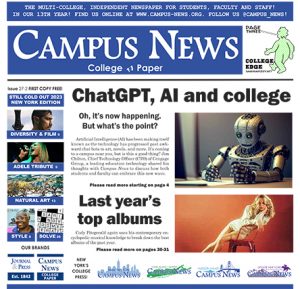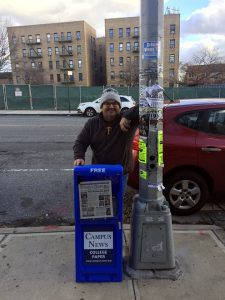By Darren Johnson
Campus News
Passable Artificial Intelligence (AI) based writing has been with us for a few years now, but only recently has become mainstream because tools like ChatGTP have been opened up to the public. Big Tech companies including Google, Facebook and Microsoft are also rushing AI projects to the market, as, now, none of them wants to be left behind – and, surely, there is profit to be made from AI.
As a college instructor in a writing-adjacent discipline, Journalism – I say “adjacent” because the teaching of journalism no longer is just teaching writing, as we also strive for fluency with audio and visual based media – I’m very wary of academia’s seeming rush to accept AI-based writing.
And, yes, I know, some newspaper chains do use AI-based writing to compile low-level pieces, such as sports roundups and community briefs, allegedly vetted by human editors before being published. In the world of Journalism, the use of AI is a topic of conversation, at least.
I can see the STEM folks heralding AI-based writing. It’s technological – the “T” in STEM – and most STEM people just see writing as a vehicle to get from Point A to Point B. It’s like how I view my midsize SUV. It just does what I want it to do, which isn’t much.
But I’ve been a bit surprised that many of my academic colleagues in writing-based disciplines haven’t rebelled against the idea of AI-based writing, and some even seem rather giddy about it. Many say they want to incorporate it into their classes. “It’s here, students are going to use it, let’s teach them better writing via these tools,” is the way I’d paraphrase the typical advocate.
Advocates say that students could run their writing through AI and get suggestions to better their work, for example. In essence, AI would be the training wheels to the bicycle of writing, though isn’t the goal of training wheels that we’d eventually take them off the bicycle? What incentive is there, for a student, to someday stop using AI to aid their writing?
Professors are busy people, and many are reporting in a Facebook group related to this topic that they are finding great joy using ChatGPT to perform mundane tasks, freeing up time for them to do more important things. For example, AI can greatly assist with writing syllabi, rubrics, lesson plans and so on. Heck, you can even run student work through AI to be marked up. The red-pen industry is going to go broke.
But are we headed for colleges where what is essentially plagiarism is accepted with a wink and a nod? It’s robot students writing for robot professors. Maybe a robot in a cap and gown can hand another robot in a cap and gown the degree on a steamy stage in May after four years of data swaps.
And isn’t that the issue – that what we’re condoning is plagiarism? (Though academic trendsters, or those who always hated writing to begin with, deny it.)
Because the ideal isn’t going to happen after the newness of AI fades.
The ideal is, a writer or professor works with AI to create greater works. The AI makes suggestions, the human accepts some, rejects others. Some back-and-forth happens. But, soon enough, the back-and-forth won’t happen. AI will get even better, students and professors will feel even more time-crunched, and what will happen is a mere quid pro quo. We – student and professor – are both using AI. Let’s just accept what it spits out, pass the class, and move on.
(Despite that I’m “writing-adjacent” at this point in time, I do still feel that writing is the most important aspect of Journalism, even if the ultimate medium is audio or visual, and I’ve definitely put in my so-called 10,000 hours as a professional writer, and don’t want to come off as a curmudgeon. I’m not – I actually am considered a modern instructor because of my fluency with technology. This is not a reactionary essay, but a warning, nonetheless.)
As a professional journalist who owns a small newspaper, I get writing submissions all of the time. Some are obviously written by AI – the submitter’s goal is to get a link on my reputable web site with the hope of helping the SEO on their less-credible web site. I also spot AI-curated copy on other newspaper sites.
The writing – while technically correct – has a certain soullessness perhaps only someone who has put in the 10,000 hours can consciously detect, but others also detect it subconsciously. They can’t say why the writing doesn’t excite them. Why it doesn’t touch their soul. They just become numb to it, gloss over it, like we do with middling TV shows.
Many daily newspapers now are hollow and have become similarly soulless.
If I decided to fill my newspaper with just AI copy, it would look like a newspaper. It would make a good movie prop. But there would be some unexplainable lifelessness to it. People might stop picking it up. Though I could still sell ads around the copy, make money, and isn’t that the point – why Big Tech is now in a space race to be Big AI?
I’m just asking you – if you are rah-rah about new AI writing technology – to take a step back and realize, perhaps, it’s not just about automating what many consider to be mundane tasks. Big Tech wants us to adopt this, and, because they are so powerful, they control the narrative. They are promoting the coolness factor in the same way social media companies did a decade or two ago at newspaper conventions.

Journalism made this mistake before. We sold out our writing on Big Tech platforms for pennies on the dollar, with the promise that we’d be a player. Instead, Big Tech took our traffic and sold their ads around it, and newspapers are now going out of business everywhere. Occasionally, Big Tech will throw a few token dollars at existing newspapers via grants, and they’ve co-opted a big press association and made them a cheerleader – but the reality is the reality. Newspapers have shriveled in print and never did find that online pot of gold, while Big Tech did.
No doubt if AI writing becomes the norm, this won’t be good for anyone but Big Tech.
First, there’s audience. Without audience, there is no purpose to an art, and writing is an art. And AI writing will always be soulless. It will be Muzak, and never Hendrix. Readers may superficially accept it, but they won’t be moved by it.
By normalizing AI-based writing, Big Tech will be able to condition audiences to give them their traffic, because they control the AI.
If we train Gen Z and beyond to create Muzak, to not put in the 10,000 hours alone with an instrument, they’ll never become Hendrix, or anywhere close to it. AI, and soulless writing, will be the future.
Big Tech already mined newspapers, and it cost thousands of jobs (and many towns are now news deserts); and now they are going after the college business model.
Academia: Don’t fall for the hype, the way journalists did a decade or two ago. If you value writing, and have influence over writers, don’t blindly give in to the AI-based writing trend. Own writing – don’t give it away. Giving your writing to a chatbot only gives the chatbot more data points and makes that chatbot stronger, and it causes your ability and your students’ ability to write – with soul – fade into the ether.
Writers will find themselves on the outside looking in, as AI-based writing becomes the standard, and devalues the art. And then an overwhelmed audience will stop caring.
It happened with newspapers, and now it will happen with other forms of writing – if we give in to the hype, and give up the power of owning our words.
 Darren Johnson is a college Journalism instructor and practicing journalist who owns Campus News.
Darren Johnson is a college Journalism instructor and practicing journalist who owns Campus News.





Facebook Comments